
JULIA LEE BARCLAY-MORTON – YOGA, WATER AND REWRITING AUTISM
I interviewed writer Julia Lee Barclay-Morton about her experience of autism. Julia began as an experimental dramatist in New York, moving to the UK to
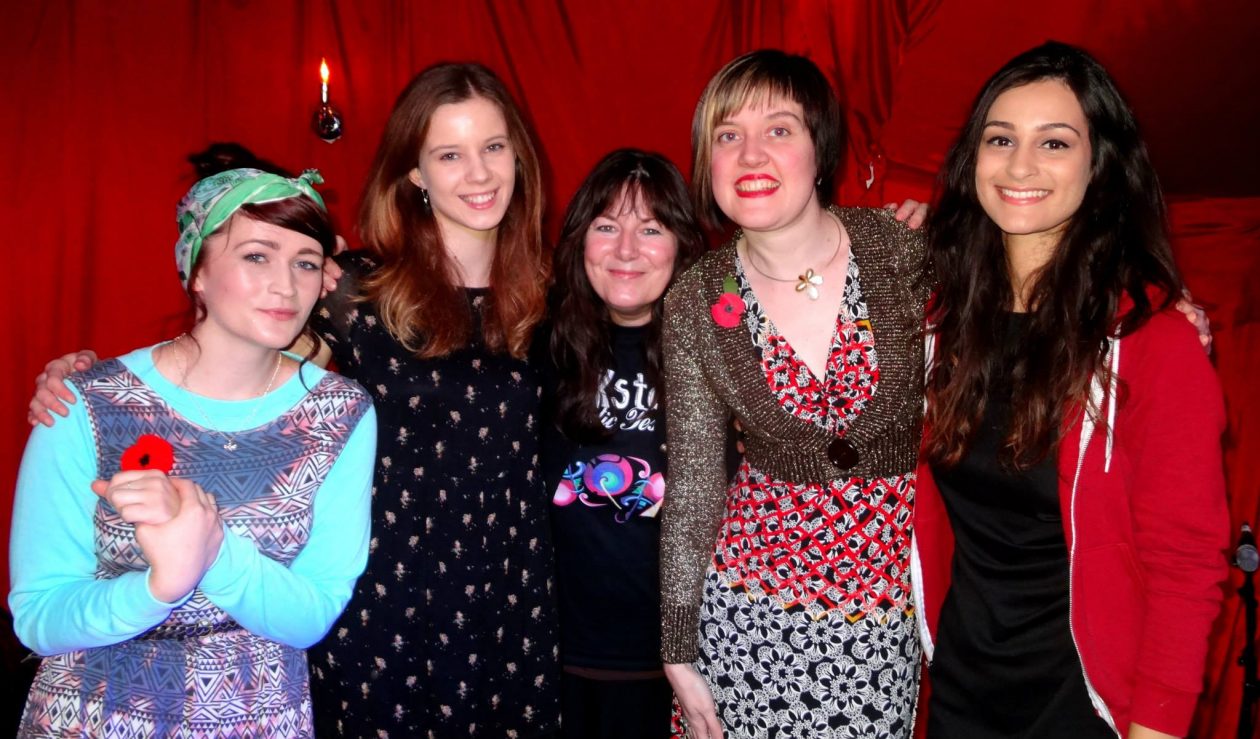
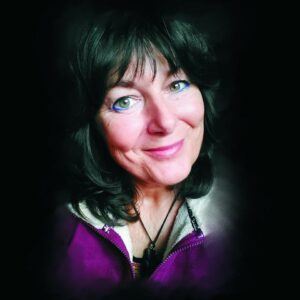
I interviewed Helen Meissner, who runs Folkstock Records: ‘A joyous fusion of contemporary and traditional acoustic folk and roots music’. With her daughter Lauren, Helen has championed female musicians and self-funded many mainstream opportunities for emerging artists. Folkstock Records, which began as a result of Helen’s recovery from cancer, has featured in many national newspapers and radio shows. As a former Businesswoman of the Year for Herts, Helen ‘gives back’ energetically to all her remarkable acts.
Leslie: How did your interest in English folk music begin, grow and develop from childhood?
Helen: Funnily enough, I have only recently become aware of folk music. It was specifically because my daughter, when she was 15, formed a band, and as they were playing ukulele, mandolin, fiddle as well as guitar and bass ukulele, with three-part harmonies, they settled on, after MUCH deliberation, the name of The Folk. They were writing their own (actually very good) songs and I wanted to help them get ‘out there’, as any proud parent would! This was 2011. They entered song writing competitions and were highly commended by Boo Hewerdine no less, in one of them. They were even picked up by Tom Robinson, who played a couple of their releases on his BBC 6 music show. Because of their name, they were invited to play at a few folk clubs, including the very broadminded Cambridge Folk Club, and I became aware of an ‘underground’ scene of exquisite musicians and singer songwriters performing a range of their own material and arrangements of traditional songs. It has been my mission ever since to bring ‘folk’ to the folk!
Leslie: How did Folkstock begin? As a third sector organisation, what are its aims and working methods?
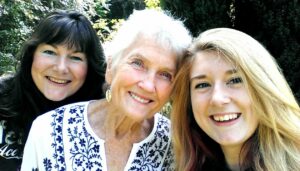
Helen: Once I had this mission and started helping a number of acts whom I came across at gigs, it wasn’t long before someone suggested I put on a festival to showcase them. I wanted to get funding, as I knew that a festival would be very expensive, as in the first year you can’t expect to break even. To help get the funding I started a community interest company with Martin Lumsden, from Cream Room Recording Studios – who had ‘spotted’ the girls when they were busking and invited them (and by default their driver/general dogsbody) into the studio to record an EP. I wanted to help people with their promotion and strategy, so I created four categories, based on where they were in their musical careers, for people to apply for 16 places for help. The county-wide press were very helpful and I was inundated. The 16 chosen acts all played at the festival, but I couldn’t resist so many other acts who were applying unasked, so it ended up being 77 acts over the four stages all in one day! I didn’t get the funding, however. I realised this before the event but didn’t want to let everyone down. So my bank account did take a bashing! However, I loved the sense of community everyone felt had been created and other projects and ideas either came to me, or were brought to me by numerous people since that unexpected beginning in 2013.
Our aim was and still is to help give exposure to acts whom the major labels might not have heard of, providing a stepping stone you could say. And to bring original music (much of it of an acoustic or folkish nature) and fresh voices to the fore. It’s a largely altruistic venture but I am learning that I need to try to cover my costs if I am to continue. A lot of acts have played at my events and we’ve had over 50 releases, all of which I’ve promoted myself, and so there’s a lovely big group of us who’ve been striving forward for the last few years who support each other – I think I am still in contact with nearly all the acts who played at the original festival, and the many events we’ve put on since then!

Leslie: Would you like to comment on what your commitment to women’s music has brought to Folkstock?
Helen: It seems to have evolved rather than been a conscious decision from the outset. Perhaps because myself and the producer (my daughter Lauren) are women, we’ve subconsciously attracted women to us? Once this became evident, however, I did want to make a point, especially when I found out that in 2014, only 14% of tracks registered with PRS for Music were by women. Which seems ridiculous. So were women not taking themselves seriously and not registering, or were there less female songwriters? I felt very strongly that I wanted to support an initiative that drew attention to these stats and so there were two main things in 2015 – the Song Sisters tour where Fiona Bevan and Kal Lavelle performed at a number of dates round the country and also did free song-writing workshops for women/girls in the afternoon. And then building on that, an album of all female artists called The F Spot : Femmes fatales of folk. Which came out on international women’s day and gained, among other lovely things, a review/recommendation in the Sunday Times. This album was opened by the wonderful Peggy Seeger who had agreed to be a Patron of Folkstock and all the other tracks were ones we released.
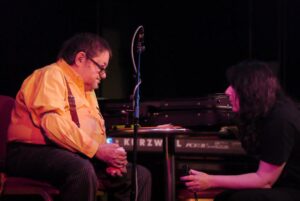
Leslie: Has personal illness played a part in shaping what you do?
Helen: I think when you face the prospect that you might die, it focuses your mind somewhat. With cancer you never know 1) how far it’s gone when you have the first confirmation of a tumour 2) whether it will return. Living with that uncertainty for me helped justify the ’living in the present‘ ethos I had been embracing already, with reiki and crystal healing. In fact, this started in my early 30s. Now I’m 52, but at 44 I had breast cancer, the ops, chemo and radiotherapy, the full works. I made a deal with whoever was listening that if I survived (and I was desperate to live till my children were ‘adult’ age -they were 13 and 15 at the time) I would devote my life to helping other people. It was after that decision that I saw the opportunity to embrace music in the emerging ‘unsigned’ world, thanks to the songs which my daughter and her band were creating. Helping them with promotion and strategy was my first step on this path in 2011, immediately after I finished my cancer treatments. As luck would have it, they performed a track they had written for my ‘end of treatment’ party, the first song they had ever written (before that they were doing covers), which excited me as I felt this would open more doors for them and I wanted to help them. I felt very aware that as I didn’t know what had caused my cancer in the first place, if I was to carry on my life in the same way, it was more likely to return. So I wanted to start afresh, start something completely new – and music was the answer.
Leslie: What have been your most creative/successful community engagement projects?
Helen: Setting up the foundation for the sixteen acts was quite successful if you look back. Nearly all the acts moved forward from that point and there was a lot of interest in what we were doing nationally. We even got into the finals for the Community Project Award in the Herts Business Awards and the festival got into the national finals for best new festival from the UK Festival awards.
The Love Folk Live project was a massive undertaking, in a condensed timeframe, we had 30 acts, ten a night, performing three tracks each, on three consecutive Mondays in January 2014. A nightmare to do the live sound for, yet my daughter Lauren handled it beautifully. A number of awards were given out and while there was meant to be an opening slot from one of the judges, Hitchin Folk Club, they ended up offering nine of the acts slots! I was amazed that acts came from all over the country for this and it was really fun to do and brought joy to January that’s for sure!
I think the hardest thing I’ve done is set up a tour from scratch for the late, great Dave Swarbrick, who was our patron. He turned 72 during the tour, and was performing fiddle with no vocal accompaniment, and chatting in his inimitably cheeky and charming way about his life. He was keen to ‘pass the baton’ to the less well-known artists and different local acts were invited to apply (via their local media/newspapers) for the opening slots, and also for a place on an EP we created where Dave Swarbrick contributed to everyone’s track in some way. He also wanted to take one act to all 17 dates with him and he wisely chose Said the Maiden. I had no experience of booking venues/negotiating rates at that point and it was a baptism by fire and I didn’t want to let Swarb down. It was a really positive experience and very, very, hard work but I was grateful for the opportunity.
The Armistice Pals charity project was also very intense. We promoted an Ep and single which featured over 100 voices from the folk world, with a track from Pete Seeger (Where Have All the Flowers Gone). I was approached by Damian Liptrot who manages Merry Hell about this. It then meant I approached Peggy Seeger, Pete’s half sister, who had already been supportive of the Song Sisters tour, and interviewed her about the track and what it meant to her and Pete. Lauren and I pitched up at her home to do her vocals and she went on to be our other patron. It was a massive marketing undertaking, involving national media and folk clubs all over the country and raised £4,000 for the four charities we were supporting. The biggest buzz for this project from a personal perspective probably came from a play on BBC Radio 2 Folk show, also one on Clare Balding’s Radio 2 Sunday morning show, and twelve live interviews and radio plays with one of the ‘voices’, Johnny Coppin, on local BBC stations around the country.
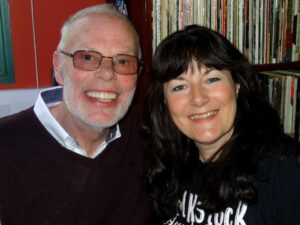
One of my great thrills has been taking a few artists to perform for Bob Harris’s Under the Apple Tree sessions (one of which was interviewed by Bob – Kelly Oliver), and meeting Bob, who has been a generous and gracious supporter of the label. I met Bob and his son Miles online via Twitter and it just goes to show that it’s not WHO you know, but how you do it. Having no contacts in the music world has made it extra hard, but extra rewarding when your efforts pay off! I also got to know Paul Sexton online and only met him a year or so ago in real life, but he’s been a tremendous ally and gave Zoe Wren her first Radio 2 play. I could go on, we’ve had almost 30 spot plays on Radio 2, the same on 6 Music, and I am grateful and excited by every single one of them so massive thanks to Chris Hawkins, Cerys Matthews, Clare Balding and Tom Robinson, who was mentioned earlier.
Leslie: What did listeners and performers gain from the ‘F Spot Live Sessions’?
Helen: I was told that it was one of Blues and Roots Radio’s most popular shows and I loved doing them. Daria Kulesh was our intrepid interviewer, and we featured a different act in each of the one-hour sessions, which ran to 33 sessions. Looking back, I can see that Daria’s interviewing style was unconventional in that there was no filter to her questions, the resultant chats tended to be quite candid and you really got a good idea of what these artists were like. The acts I invited ranged from nationally well know acts such as Lucy Ward, Maz OConnor, Johnny Coppin, Luke Jackson, Dan Walshe, Ange Hardy to Zoe Wren, Kaity Rae, Kelly Oliver, Jamie Doe (aka The Magic Lantern as championed recently by Tom Robinson on 6 Music), The Black Feathers, Louise Jordan, Hattie Briggs (who was recently on the TV having been asked to open for Alfie Boe while busking), Minnie Birch, Ben Smith (who is now in duet Smith and Brewer) Lukas Drinkwater, Fred’s House and more. We really were blessed. We did them in the studio and Lauren recorded the live performances and chat – you can listen here if you’d like some radio gold.
Leslie: Are there any anecdotes that sum up what directing Folkstock is like?
Helen: I never know from one day to the next what opportunities will be presented to me. The word ‘spontaneous’ springs to mind. And I am very much a ‘do it now’ kind of person. So while I can plan releases and their promotional schedules – taking up a lot of time and brain power – there’s a million and one other things I do every day which are unplanned! A tweet can send me down a rabbit hole and end up starting the next project, seeing someone ask for acts to support them on tour, or discovering a new blog which might feature my artists – and that in turn can mean that I reprioritise ALL day, to try to get the best outcomes for the people I am helping or releasing. I wake every morning with a sense of adventure and excitement and usually go to bed tired and exhausted (without having left my laptop all day!). But by next morning, it all starts again and I am re-energised! I am lucky because everyone I have dealings with comes back to me really promptly so I can get a lot done, or acted upon, that way. And people don’t seem to let me down, which is another fabulous bonus! So once something is arranged, that’s usually it. I also can’t seem to help myself from encouraging people to express themselves through singing, if they have a talent in that direction. My latest ‘victim’ is my other half John, who as Joe Rose has been in the studio for the first time aged 60 (weeks after we met!) and has released a couple of tracks and raised hundreds of pounds for charity. His next single is a departure for me, a cover of Empty Chairs at Empty Tables, but to me it’s all about encouraging talent and providing inspiration to others to follow their dream. If his response from radio , press and regional TV appearances are anything to go by, he could have a late blossoming career as a singer!
Leslie: What would be your advice to anyone setting up an independent music label today?
Helen: It would depend why they are setting it up! If it’s to make their millions, they might have to work VERY hard (and I am not sure it’s possible by design). If an artist is going to ‘make it’, and they start with you, they will be approached by larger labels who might buy you out, (or worse!). So it’s probably got to be for the love of the music. Obviously, it would depend if the label was funded and there were other people involved, which would mean that the roles would vary. For Folkstock Records, it’s just me really, so apart from production (and I do the executive production), I do all the roles, the choosing of the acts/A&R, the promotion, the radio plugging and the artist management/liaison. So my tips for people in that situation are:
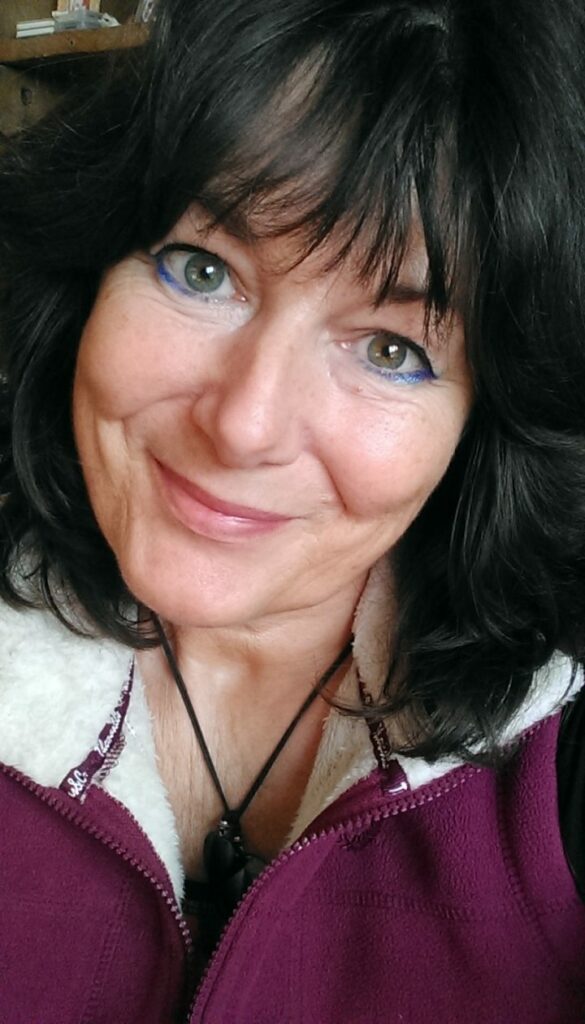
Try to build in some time every day when you move your body rather than being glued to a keyboard! Once you see how much is possible, it’s tempting to try to capitalise on every promotional opportunity and it’s SO engrossing that you can end up getting RSI and other joint related issues. Clearing your head, without being stimulated by a screen can really help you refocus and remember some of the things you actually NEED to do, instead of the new and exciting opportunities which are always presenting themselves!
Next Monday radical actor, playwright and director Polly Wiseman talks about her work with her company Fireraisers that produces ‘extraordinary theatre in unexpected places’.
ABOUT LESLIE TATE’S BOOKS:

I interviewed writer Julia Lee Barclay-Morton about her experience of autism. Julia began as an experimental dramatist in New York, moving to the UK to

I interviewed Gillean McDougall from Glasgow, who edited the collaborative projects Honest Error (on Charles Rennie Mackintosh and his wife Margaret Macdonald) and Writing the

I interviewed French writer Delphine de Vigan, whose book, No et moi, won the prestigious Prix des libraires. Other books of hers have won a clutch

I interviewed Joanne Limburg whose poetry collection Feminismo was shortlisted for the Forward Prize for Best First Collection; another collection, Paraphernalia, was a Poetry Book Society Recommendation. Joanne

I interviewed Katherine Magnoli about The Adventures of KatGirl, her book about a wheelchair heroine, and Katherine’s journey from low self-esteem into authorial/radio success and
| Cookie | Duration | Description |
|---|---|---|
| cookielawinfo-checkbox-analytics | 11 months | This cookie is set by GDPR Cookie Consent plugin. The cookie is used to store the user consent for the cookies in the category "Analytics". |
| cookielawinfo-checkbox-functional | 11 months | The cookie is set by GDPR cookie consent to record the user consent for the cookies in the category "Functional". |
| cookielawinfo-checkbox-necessary | 11 months | This cookie is set by GDPR Cookie Consent plugin. The cookies is used to store the user consent for the cookies in the category "Necessary". |
| cookielawinfo-checkbox-others | 11 months | This cookie is set by GDPR Cookie Consent plugin. The cookie is used to store the user consent for the cookies in the category "Other. |
| cookielawinfo-checkbox-performance | 11 months | This cookie is set by GDPR Cookie Consent plugin. The cookie is used to store the user consent for the cookies in the category "Performance". |
| viewed_cookie_policy | 11 months | The cookie is set by the GDPR Cookie Consent plugin and is used to store whether or not user has consented to the use of cookies. It does not store any personal data. |
2 responses
Lovely interview, thank you. Helen is such a lovely person. 🙂
🙂 🙂 🙂